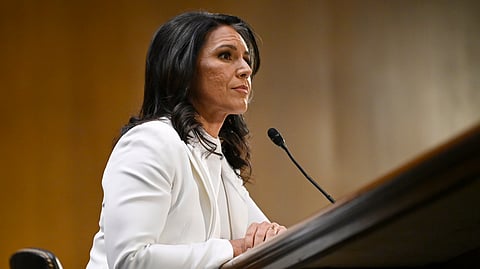Who is Tulsi Gabbard, the US Intel Director, with a strong bond to India?
Tulsi Gabbard, a former Democratic congresswoman, has recently been confirmed as the Director of National Intelligence (DNI) in the United States. The Senate vote, held on Wednesday, saw Gabbard’s nomination pass with a narrow 52-48 margin. Endorsed by President Donald Trump, Gabbard now oversees and coordinates the work of America’s 18 intelligence agencies, marking a significant and somewhat controversial moment in US politics.
Gabbard, who took an oath on the Bhagavad Gita during her time as a member of the US House of Representatives, has made headlines for her outspoken views on U.S. foreign policy, her departure from the Democratic Party in 2022, and her strong advocacy for India and Hindu Americans.
Political Career
According to a recent Indian Express report, Tulsi Gabbard’s political journey has been one of significant achievements and controversies. She made history as the first Hindu to serve in the U.S. Congress, representing Hawaii from 2013 to 2021. In 2020, she made an unsuccessful run for the Democratic presidential nomination. However, her political career took a decisive turn when she left the Democratic Party in 2022, citing its elitism and embracing an independent political identity.
Her background is equally diverse: Gabbard is an Iraq War veteran, having served as a lieutenant colonel in the National Guard with three deployments in war zones. Despite these military credentials, Gabbard’s lack of experience in intelligence or national security has been a point of contention among critics who question her qualifications for leading the US intelligence community.
Despite her limited experience in intelligence matters, Gabbard’s confirmation as DNI is a reflection of President Trump’s trust in her capabilities. Trump has described her as a “fearless” leader who has fought for the freedom of America and all Americans for more than two decades. Her critics, however, have raised concerns about her past positions, particularly regarding her views on Russia, Syria, and Edward Snowden.
Gabbard's support for figures like Russian President Vladimir Putin, her defence of former Syrian President Bashar al-Assad, and her praise for Snowden have been points of significant controversy. These views have raised eyebrows, particularly in light of her new role in overseeing US intelligence, a position that demands a high level of trust and experience in national security affairs.
Special bond with PM Narendra Modi
One of the defining features of Gabbard’s political career has been her close relationship with Indian Prime Minister Narendra Modi. Due to her first name, Gabbard is often mistaken for being of Indian origin. However, she has made it clear that she is not of Indian descent but has strong personal and political ties to India, primarily through her Hindu faith. Her mother, who converted to Hinduism, raised her children with Hindu names, including Bhakti, Jai, Aryan, Vrindavan, and Tulsi, reported Indian Express.
Gabbard's Hindu identity has made her a popular figure among Indian Americans, and she has used her platform to advocate for Indian interests on the global stage. She has consistently supported Modi, even criticising the U.S. government’s decision to ban him from entering the country following the 2002 Gujarat riots, calling it “a great blunder”. She also strongly supported Modi’s call for International Yoga Day in 2014.
In a notable gesture, Gabbard took her oath of office in the U.S. House of Representatives with her hand on the Bhagavad Gita, a gesture that made headlines. She later gifted the same copy of the holy book to Prime Minister Modi when they met in New York in 2019.
Gabbard has consistently spoken out in support of India on key issues, such as condemning Pakistan’s role in harbouring terrorists and voicing solidarity with the victims of the 2019 Pulwama attack, which claimed the lives of 40 CRPF personnel. Her strong stance against terrorism, particularly in relation to Pakistan, has resonated with both the Indian government and the Indian American community.
Gabbard's views and controversies
While Gabbard has enjoyed significant support from Indian Americans, her views on global affairs have drawn both admiration and criticism. She has been vocal in opposing US intervention in foreign conflicts, particularly in Syria and Ukraine. Her stance on Russia’s invasion of Ukraine, which aligns with some Russian propaganda, has been particularly contentious, as has her defence of Bashar al-Assad in Syria.
Additionally, Gabbard’s praise for Edward Snowden, who exposed classified US surveillance programmes, has placed her at odds with many in the US intelligence community. She has called Snowden’s revelations important while condemning his actions as unconstitutional, a nuanced position that has led to both support and criticism.
Despite these controversies, Gabbard’s supporters maintain that she brings a fresh and independent perspective to the role of Director of National Intelligence. Her focus on defending constitutional rights and her commitment to securing peace through strength are key aspects of her approach to intelligence leadership.
Tulsi Gabbard’s confirmation as the Director of National Intelligence marks a new chapter in U.S. intelligence. Her diverse background, strong convictions, and unique political identity promise to influence her approach to overseeing America’s intelligence agencies. Whether her tenure will help reshape U.S. intelligence operations or further divide opinion remains to be seen. However, one thing is certain: Gabbard’s leadership will be closely watched by both allies and critics alike.
Her meeting with Prime Minister Modi, shortly after her confirmation, reflects the ongoing strength of the India-U.S. relationship, with Gabbard poised to play a significant role in shaping future diplomatic and intelligence cooperation between the two nations.

